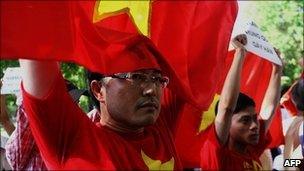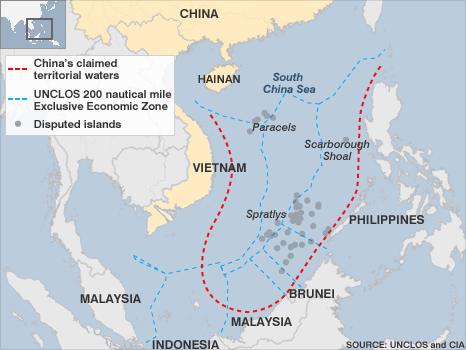Vietnam's anger over China maritime moves
- Published

Hundreds of Vietnamese gathered in front of the Chinese Embassy in Hanoi on Sunday
Hong Mai is an 18-year-old student from Hanoi who loves hip-hop music and dancing. Do Trung Quan, 56, is a poet, who lives in Ho Chi Minh City.
They both took to the streets in their respective cities after seeing messages on the internet calling for a "peaceful rally" against China's policies in the South China Sea.
Hundreds of Vietnamese gathered in front of the Chinese Embassy in Hanoi on Sunday despite the blazing summer heat.
Wearing T-shirts with the red and yellow Vietnamese flag, they carried banners reading: "Down with China" and "Stop China's invasion of Vietnam's islands".
The number of people joining the rally was even greater in Ho Chi Minh, where witnesses said numbers had exceeded 1,000.
After being turned away from the Chinese offices, the crowds marched through the centre of the cities, chanting anti-China slogans and singing revolutionary songs.
They were dispersed by police later that morning.
"It was really orderly and peaceful. Everyone was on their best behaviour. And we did not leave behind a scrap of rubbish," wrote a Hanoi-based blogger on Facebook.
Vietnam has accused China of sending surveillance ships to harass and damage a Vietnamese oil exploration vessel "operating deep inside Vietnamese waters" on 26 May.
The Vietnamese government, criticised for a long time by the public for being passive and weak before China, responded strongly to the confrontation, calling it a "serious violation of Vietnam's sovereignty".
China blamed Vietnam, saying its oil and gas operations "undermined China's interests and jurisdictional rights".
China, Vietnam, the Philippines, Malaysia, Brunei and Taiwan all claim territories in the South China Sea. China's claim is by far the largest and includes the Spratly and Paracel archipelagos.
Activists detained
Appeals for anti-China demonstrations in Vietnam were spread via Facebook and other social networks, as well as mobile phones - raising concern and suspicion in official circles.
Vietnam is a one-party state and the government here does not tolerate dissent.
Protests are rare, especially those of a political nature.
Attempts to organise anti-China rallies in the past were quashed by the authorities, with activists detained and even imprisoned.
One of the main concerns of the Hanoi government is public agitation could be exploited by "hostile forces" aiming to topple the regime.
Nationalistic flames, once lit, can be difficult to extinguish.
Vietnam has also tried hard not to offend its neighbour China, with whom it has had a long and close relationship, though turbulent at times.
Deputy Minister of Defence Nguyen Chi Vinh denied the protests in Hanoi and Ho Chi Minh City were officially sanctioned.
"They are totally spontaneous," he said, adding that the crowds "voluntarily" dispersed without causing any trouble.
Despite being peaceful, he said the rallies "should not happen again".
But Wang Hanling, of the Beijing-based International Laws Institute of the Chinese Academy of Social Sciences, said mass rallies would be impossible in Vietnam without the government's consent.
"The South China Sea is a big and difficult issue and should be settled peacefully between the two governments," he said. "Protests of this kind won't help."
But with public pressure building in Vietnam over China's stance in the South China Sea, there are calls for more protests in the near future.

- Published5 June 2011
- Published30 May 2011
- Published3 September 2010